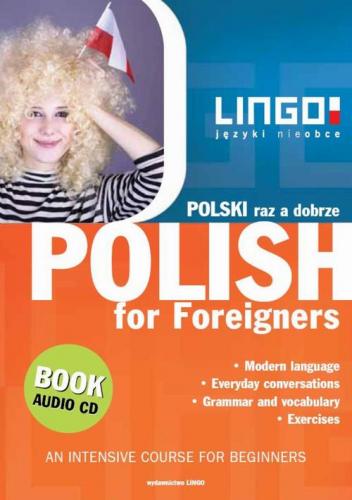Stanisław Mędak
POLISH
for Foreigners
POLSKI raz a dobrze
AN INTENSIVE COURSE FOR BEGINNERS
Elementary level
A1, A2, B1
English translation
Dennis McEvoy
Projekt okładki serii: Marcin Rojek, 2-arts.com
Projekt makiety i opracowanie graficzne: Studio 27
Zdjęcie na okładce: © Massonforstock / Fotolia
Redakcja i korekta: Paweł Pokora
Korekta angielska: Michael Mulkeen, Dominique Seillon
Opracowanie wersji elektronicznej oraz konwersja:
ISBN: 978-83-60287-94-1
ISBN epub: 978-83-7892-053-3
ISBN mobi: 978-83-7892-054-0
© Copyright by Wydawnictwo Lingo sp.j., Warszawa 2013
Instead of an introduction
Starting from the first lesson, the textbook Polski raz a dobrze introduces simple and useful syntactic structures of the Polish language. The problems contained within the textbook are progressively developed in terms of morphology, inflections, as well as the vocabulary of modern Polish. Basic information concerning functional grammar and vocabulary is given in the sections HOW DOES IT WORK? The large amount of practical information provided should help the student quickly assimilate useful vocabulary and an understanding of the function of cases, as well as accustom the student to Polish syntax.
In order to create one’s “own” answer, or “own” question, it is enough to memorize the sample sentences or fragments of sentences, as well as the short explanations.
In the textbook dictionaries, lists, and tables not only is vocabulary provided, but also verb syntactic combinations, contextual aspect pairs, syntactic constructions, and expressions.
The student will find in the 25 textbook dialogues real Polish adapted to the grammatical demands of the Polish language. The first 10 dialogues act as a linguistic bridge that eases the passage to the latter and more demanding dialogues that follow in the goal of attaining grammatical competence. Attaining other competencies should occur with the systematic repetition of the dialogues, the solving of the exercises, and using the answers found in the exercise keys. It’s also recommended using the various syntactic constructions contained within the explanatory sections.
Most of the exercises contained within Polski raz a dobrze are creative exercises. They were conceived so as to aid students in the writing of the answers (words, grammatical forms, expressions) resulting from the context.
The entire textbook is intended for those studying Polish at the elementary level A1, A2, B1. The scope of the grammatical and lexical material also covers the demands for later stages of the elementary level.
Kraków, May 8th, 2010.
Important note
The first four lessons in the coursebook Polski raz a dobrze present basic Polish structures and phrases which are useful in everyday communication. These structures are introduced in natural dialogue and are marked in colour. They are translated below. We hope this strategy will enable the learner to acquire effortlessly not only basic sentence structures, questions and answers, but also Polish letters, sounds and intonation.
Alphabet
a, A a Anna
ą, Ą ą
b, B be Bogdan
c, C ce Celina
ć, Ć cie Ćwik
d, D de Danuta
e, E e Ewa
ę, Ę ę Mędak
f, F ef Franciszek
g, G gie Gerard
h, H ha Halina
i, I i Irena
j, J jot Janina
k, K ka Katarzyna
l, L el Ludwik
ł, Ł eł Łucja
m, M em Maria
n, N en Natalia
ń, Ń eń Kosiński
o, O o Onufry
ó, Ó ó (o kreskowane) Waligóra
p, P pe Paweł
r, R er Roman
s, S es Stanisław
ś, Ś eś Leśniak
t, T te Tomasz
u, U u Urszula
w, W wu Wacław
y, Y y (igrek) –
z, Z zet Zenon
ź, Ź ziet Ździebło
ż, Ż żet Żbik
Letters and sounds
letter (group of letters) examples
a A Anna, baran, mama, pan
ą drąg, idą, kąt, piszą, są, wąż, wziął, wąs
b B banan, bo, cebula, chleb, pobudka
c C co, cyna, cytryna, koc, lekcja, nic, noce, więc
c + i cicho, ciocia, ciasto, cienki, ci, ciuciubabkapch = (h) chodnik, choroba, klechda, kochać, suchy, Wojciechpch + i architekt, Chinka, chimery, chirurg, wymachiwaćpcz czar, czas, Czech, kaczka, kicz, praczka, taczkapć bić, być, ćma, grać, mówić
d D do, dam, dobry, dom, dyrektor, pod, płód
dz dzbanek, dzwonić, ksiądz, pieniądze, wódzpdz + i dziadek, dzień, dziesięć, dziewczyna, dziewięć, dziśpdź bądź, chodź, dźwięk, jedźmy, wejdźpdż dżem, dżungla, dżdżysty
e E chleb, gorzej, jemy, nowe, pewien, sen, te, wiem
ę dębowy, gęś, imię, język, kęs, kliknęła, lęk, męski, myję się, pięć, ręka, tę, wzięła, zięć
f F fakt, fant, fantastyczny, film
g G gapa, gdy, go, Bóg, gapić się, próg
g + i gilotyna, giniemy, gitara, piegi
h H = (ch) halka, hałas, herbata, historia
h + i historia, Hindus, Hiszpan
i I ci, idol, imię, Irena, liczyć, lipa, list, mina, oni
j J daj, gorzej, ja, Janek, jeden, jeść, jutro, mniej
k K kilogram, kot, Kraków, kto, ktoś, lekko, rówieśnik
k + i kieszeń, kilo, kino, ludzki
l L alkohol, dla,
